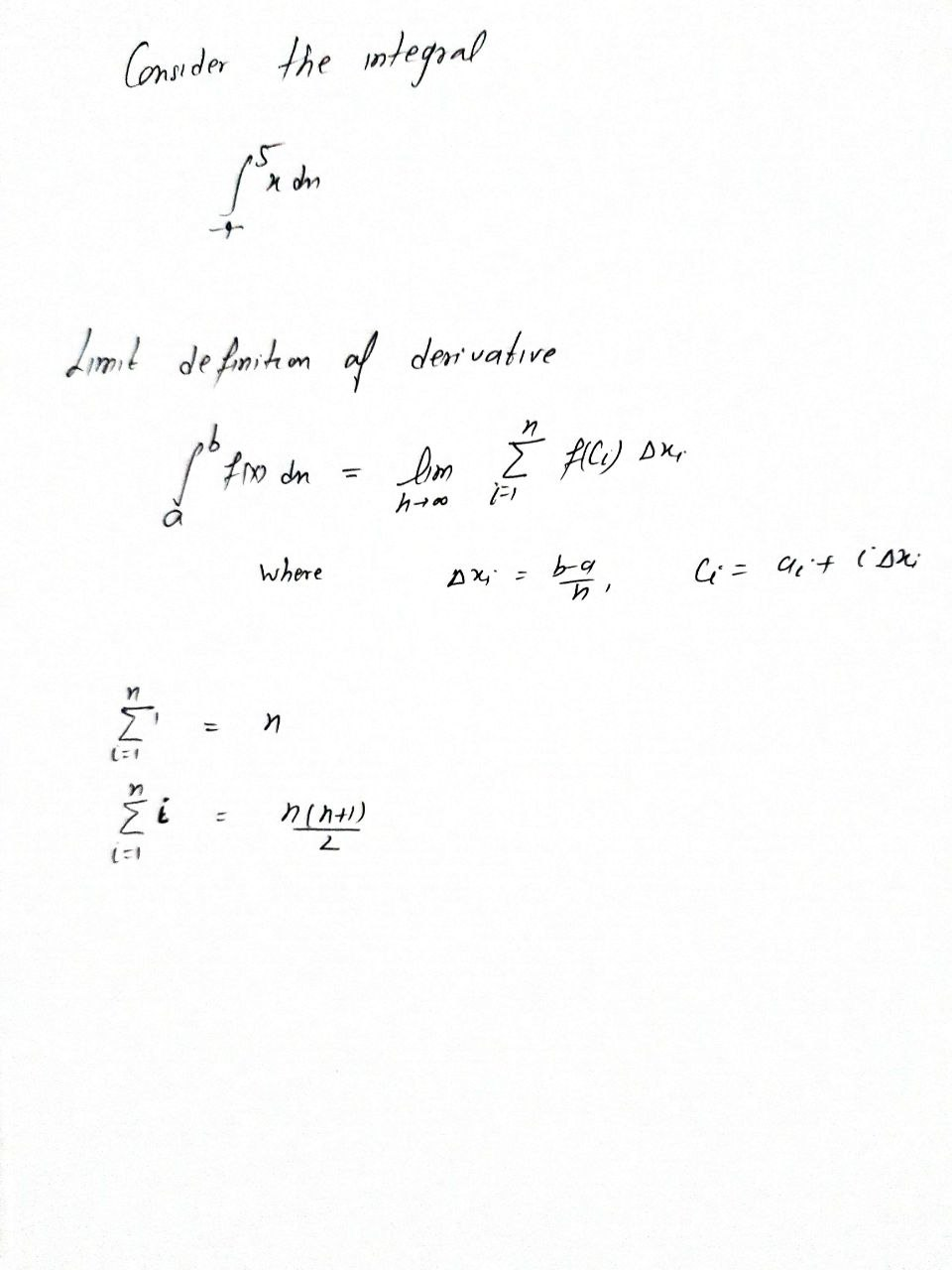Calculus: Early Transcendentals
8th Edition
ISBN:9781285741550
Author:James Stewart
Publisher:James Stewart
Chapter1: Functions And Models
Section: Chapter Questions
Problem 1RCC: (a) What is a function? What are its domain and range? (b) What is the graph of a function? (c) How...
Related questions
Question
make sure you do it in a white paper. do not type it. show all work
![### Evaluate the Definite Integral by the Limit Definition
The problem requires evaluating the definite integral of the function \( f(x) = x \) from \(-4\) to \(5\) using the limit definition of the integral.
\[
\int_{-4}^{5} x \, dx
\]
This involves applying the fundamental theorem of calculus and understanding the concept of the Riemann sum, which approaches the definite integral as the number of subintervals goes to infinity.
**Steps to Solve:**
1. **Partition the Interval**: Divide the interval \([-4, 5]\) into \(n\) subintervals of equal width \(\Delta x = \frac{5 - (-4)}{n} = \frac{9}{n}\).
2. **Choose Sample Points**: Typically, choose the right endpoint of each subinterval as the sample point. In general terms, the right endpoint can be expressed as \(x_i = -4 + i \Delta x\).
3. **Riemann Sum**: Form the Riemann sum, which approximates the area under \(f(x)\).
\[
R_n = \sum_{i=1}^{n} f(x_i) \Delta x = \sum_{i=1}^{n} \left(-4 + i \cdot \frac{9}{n}\right) \cdot \frac{9}{n}
\]
4. **Limit Definition of Integral**: The definite integral is obtained by taking the limit as \(n\) approaches infinity:
\[
\int_{-4}^{5} x \, dx = \lim_{n \to \infty} R_n
\]
**Final Evaluation**: Compute the above expression following these steps to find the value of the definite integral.
**Result Box**: An empty box is provided for inputting the final computed value of the integral.
In practice, you will find that this process leads to:
\[
\int_{-4}^{5} x \, dx = \frac{x^2}{2} \Big|_{-4}^{5} = \left(\frac{5^2}{2}\right) - \left(\frac{(-4)^2}{2}\right) = \frac{25}{2} - \frac{16}{2} = \frac{9}{2}](/v2/_next/image?url=https%3A%2F%2Fcontent.bartleby.com%2Fqna-images%2Fquestion%2F07f64844-f44f-4fd0-96ac-4d29f63737de%2F4b17432d-f405-43c2-a402-8c627bd07514%2Fuhigk4f_processed.jpeg&w=3840&q=75)
Transcribed Image Text:### Evaluate the Definite Integral by the Limit Definition
The problem requires evaluating the definite integral of the function \( f(x) = x \) from \(-4\) to \(5\) using the limit definition of the integral.
\[
\int_{-4}^{5} x \, dx
\]
This involves applying the fundamental theorem of calculus and understanding the concept of the Riemann sum, which approaches the definite integral as the number of subintervals goes to infinity.
**Steps to Solve:**
1. **Partition the Interval**: Divide the interval \([-4, 5]\) into \(n\) subintervals of equal width \(\Delta x = \frac{5 - (-4)}{n} = \frac{9}{n}\).
2. **Choose Sample Points**: Typically, choose the right endpoint of each subinterval as the sample point. In general terms, the right endpoint can be expressed as \(x_i = -4 + i \Delta x\).
3. **Riemann Sum**: Form the Riemann sum, which approximates the area under \(f(x)\).
\[
R_n = \sum_{i=1}^{n} f(x_i) \Delta x = \sum_{i=1}^{n} \left(-4 + i \cdot \frac{9}{n}\right) \cdot \frac{9}{n}
\]
4. **Limit Definition of Integral**: The definite integral is obtained by taking the limit as \(n\) approaches infinity:
\[
\int_{-4}^{5} x \, dx = \lim_{n \to \infty} R_n
\]
**Final Evaluation**: Compute the above expression following these steps to find the value of the definite integral.
**Result Box**: An empty box is provided for inputting the final computed value of the integral.
In practice, you will find that this process leads to:
\[
\int_{-4}^{5} x \, dx = \frac{x^2}{2} \Big|_{-4}^{5} = \left(\frac{5^2}{2}\right) - \left(\frac{(-4)^2}{2}\right) = \frac{25}{2} - \frac{16}{2} = \frac{9}{2}
Expert Solution
Step 1

Step by step
Solved in 3 steps with 3 images

Recommended textbooks for you

Calculus: Early Transcendentals
Calculus
ISBN:
9781285741550
Author:
James Stewart
Publisher:
Cengage Learning

Thomas' Calculus (14th Edition)
Calculus
ISBN:
9780134438986
Author:
Joel R. Hass, Christopher E. Heil, Maurice D. Weir
Publisher:
PEARSON

Calculus: Early Transcendentals (3rd Edition)
Calculus
ISBN:
9780134763644
Author:
William L. Briggs, Lyle Cochran, Bernard Gillett, Eric Schulz
Publisher:
PEARSON

Calculus: Early Transcendentals
Calculus
ISBN:
9781285741550
Author:
James Stewart
Publisher:
Cengage Learning

Thomas' Calculus (14th Edition)
Calculus
ISBN:
9780134438986
Author:
Joel R. Hass, Christopher E. Heil, Maurice D. Weir
Publisher:
PEARSON

Calculus: Early Transcendentals (3rd Edition)
Calculus
ISBN:
9780134763644
Author:
William L. Briggs, Lyle Cochran, Bernard Gillett, Eric Schulz
Publisher:
PEARSON

Calculus: Early Transcendentals
Calculus
ISBN:
9781319050740
Author:
Jon Rogawski, Colin Adams, Robert Franzosa
Publisher:
W. H. Freeman


Calculus: Early Transcendental Functions
Calculus
ISBN:
9781337552516
Author:
Ron Larson, Bruce H. Edwards
Publisher:
Cengage Learning